Opinion
Benjamin Okezie Kalu: Understanding a Misunderstood Patriot

**
By Philip Agbese
In a careful examination of the dynamics in Nigeria’s political stronghold, one will discover that only a selected few possess the courage and conviction to make bold statements that have the potential to profoundly transform the topography of democracy and governance for the better. Among these exceptional individuals, Benjamin Okezie Kalu stands out as a paragon of patriotism, exemplifying a fearless and unshakeable commitment to his principles. As the representative of the Bende constituency in the 10th National Assembly and Deputy Speaker of the House of Representatives, Kalu has established himself as a tireless advocate for his constituents and a devoted supporter of the All Progressives Congress (APC).
Throughout his political journey, Kalu has consistently demonstrated a steadfast adherence to transparency, loyalty, and an unyielding dedication to truthfulness, a combination that often elicits both admiration and misinterpretation. To truly comprehend the essence of Benjamin Kalu is to recognize an individual whose allegiance to his causes and party is unwavering and unshakeable, guided by an unerring moral compass that directs his actions and decisions with unshakeable conviction.
Kalu is a man who unapologetically declares his affiliations and beliefs, refusing to conceal his convictions or compromise his values. Regardless of the criticisms or accolades he receives, Kalu remains resolute in his principles, never betraying the trust of his business associates or political allies. In a political environment where allegiances often shift with the winds of circumstance, Kalu’s unwavering steadfastness is a rare and commendable attribute, distinguishing him as a true champion of his people and a loyal steward of his party’s ideals.
Benjamin Kalu’s devotion to his constituency and the wider community transcends mere political rhetoric, serving as a poignant testament to his sincere and profound concern for the well-being of those he has sworn to serve. Throughout his tenure, he has tirelessly endeavored to effect meaningful transformation and development, consistently prioritizing the needs of his people above all else. Whether advocating for vital infrastructural enhancements or championing policies that tangibly benefit his constituents, Kalu has immensely placed the welfare of his people at the forefront of his agenda, demonstrating an unshakeable commitment to their prosperity.
One of Kalu’s most distinctive and defining characteristics is his dedication to speaking truth to power, regardless of the consequences or repercussions. In a political landscape often marred by deception, equivocation, and duplicity, Kalu stands as a shining beacon of honesty and integrity, unafraid to express his convictions with unflinching candor. Love him or hate him, Kalu will invariably tell it like it is, without hesitation or reservation. Even in the face of adversity, persecution, or vitriolic criticism, he will return with unwavering resolve, still speaking truth to power with unshakeable conviction. This remarkable aspect of his character has earned him both fervent admirers and vocal detractors, yet it remains one of his most admirable and enduring qualities.
Throughout his political odyssey, Kalu has navigated a plethora of controversies, with the most recent being a video that sparked intense debate, wherein he extended an invitation to Alex Otti, the Governor of Abia State and a member of the Labor Party (LP), to join the All Progressives Congress (APC). Critics have misconstrued this gesture, insinuating ulterior motives, particularly ambitions for the governorship of Abia State. However, a more nuanced examination reveals a disparate narrative.
It is pertinent to recall that Alex Otti, a former stalwart of the APC and a contender in the 2023 governorship election in Abia State, relinquished his membership in the party during the primary elections to contest under the Labor Party, ultimately emerging victorious. Kalu’s response to this development was characteristic of his forthright nature, as he forthwith invited Otti to rejoin the APC, a move perceived by some as a calculated political maneuver, but in reality, was just a revelation into Kalu’s commitment to the party’s ideals.
Regrettably, this incident, among others, has been distorted to portray Kalu in an unfavorable light, with critics leveraging it to suggest that he harbors aspirations for the governorship of Abia State. However, this assertion is patently false. Kalu’s invitation to Otti was not a power play, but a genuine expression of concern for his fellow politician, borne out of a desire to see Otti align with a federal party and reap the attendant benefits. This gesture was emblematic of Kalu’s spirit of brotherly love and his commitment to fostering unity and cooperation in the political sphere.
In politics, persuasion is a complex and multifaceted instrument, often necessitating the judicious application of both affectionate diplomacy and strategic inducements to harmonize disparate interests. Kalu’s invitation to Otti was not a cynical ploy for personal aggrandizement, but rather a sincere expression of fraternal affection and prescient strategic foresight. By encouraging Otti to join a functional federal party, Kalu was extending an olive branch, offering the potential for greater alignment and mutual benefit within the larger political framework, thereby fostering a spirit of cooperation and unity.
Kalu’s actions are a reflection of the APC’s philosophy of inclusivity, which has been exemplified by the party’s significant strides in promoting unity and progress in Nigeria under the leadership of President Tinubu. The current administration, led by President Tinubu of the APC, has demonstrated a commendable commitment to inclusivity in governance, appointing individuals from across political lines. It is hypocritical for opposition parties to criticize Kalu’s actions while ignoring the APC-led administration’s efforts to promote development in Abia State. The appointment of Abians in the administration and the establishment of the South East Development Commission demonstrate a commitment to progress, regardless of political affiliations or loyalty. This approach underscores the APC’s dedication to progress and inclusivity, irrespective of the party affiliations of state leaders like Governor Otti. This vision is one that Kalu shares and actively promotes.
Critics who view Kalu’s actions and the broader APC strategy as politically motivated, miss the larger picture. The invitation extended to Otti is not a mere political maneuver but part of a broader vision for unity and development, reflecting a commitment to building bridges and fostering collaboration for the betterment of Abia State and Nigeria as a whole.
Benjamin Okezie Kalu is more than just a politician; he is a steadfast patriot, one who is strongly committed to the principles of truth, transparency, and the unrelenting pursuit of progress for his people. His unshakeable allegiance to the APC and his tireless dedication to the welfare of his constituents are poignant manifestations of his profound and abiding love for his country. To truly comprehend Kalu, one must delve beyond the superficial controversies and appreciate the deeply ingrained convictions that define his political odyssey.
Upon closer examination of this narrative and Kalu’s actions, a discerning individual will astutely infer that Kalu’s ultimate intention is to safeguard Alex Otti’s interests. Given the All Progressives Congress’s (APC) remarkable progress and achievements at the federal level, the Labor Party (LP) struggles to match APC’s impressive record of accomplishments, particularly in terms of attracting influential political figures and making significant strides in governance. As a capable and effective leader, Alex Otti may inadvertently miss out on pivotal opportunities and the broader scope of national politics if he fails to consolidate his position within the LP or considers aligning with the ruling party, APC, which offers more substantial benefits and a larger platform for impact.
Kalu, with his astute political acumen, is acutely aware of this dynamic and is attempting to guide his friend, Alex Otti, by encouraging him to rejoin the APC, thereby ensuring Otti’s continued relevance and influence in the grand scheme of Nigerian politics. Kalu’s actions are motivated by a desire to help Otti capitalize on the opportunities offered by the APC’s momentum and progress, rather than risking marginalization within the LP.
It is hardly astonishing that the criticisms leveled against Kalu by opposition parties are not directly targeted at him, but rather, are veiled attacks, motivated by self-interest, and ultimately aimed at the Governor of Abia State, Alex Otti. These attacks are designed to dissuade him from seizing a remarkable opportunity that lies before him, thereby depriving him of the potential benefits and advantages that could accrue from aligning with the APC. By extension, the opposition’s strategy seeks to undermine Otti’s political prospects and hinder his ability to capitalize on the APC’s momentum and progress, thus perpetuating their own vested interests.
Despite the cacophony of criticisms and the plethora of misunderstandings, Kalu remains a beacon of integrity and patriotism, a shining exemplar of unyielding principle and steadfast conviction. Figures like Benjamin Kalu serve as vital pillars of integrity and resolve, their stories is a poignant reminder that true patriotism is not about personal aggrandizement but about selflessly serving the greater good, even in the face of unrelenting criticism and misunderstanding.
Benjamin Kalu is a man who will not betray his principles, neither in the realm of business nor in the political arena. His commitment to his values is an evidence to his unshakeable character. In conclusion, Kalu is a man often misunderstood, his actions misconstrued, and his words taken out of context. However, those who possess intimate knowledge of him understand that he is a man of unyielding principle, a champion of his people, and a steadfast adherent to his beliefs. He embodies, in every sense of the word, the quintessence of patriotism.
Agbese is the Deputy Spokesman, 10th House of Representatives.
Opinion
Beyond APC’s Flashes of Many Colours- Thisdaylive
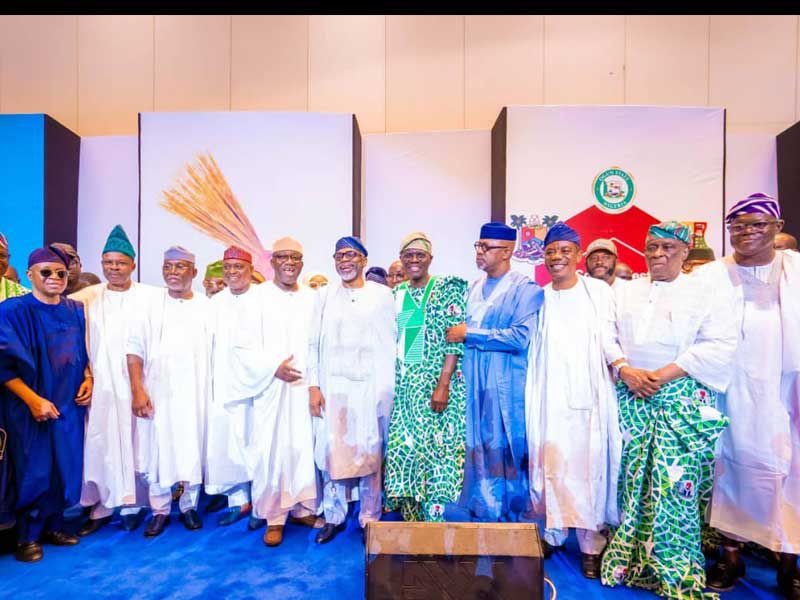
A lot currently rests on the shoulders of the South West geo-political zone, and her leadership is not oblivious of this fact. As a cosmopolitan region with some level of political sophistication, it is one part of the country that has always played a significant role in the nation’s rich political history.
Even more instructive at this time in the life of the nation, is that it is the zone, where the incumbent president, Bola Tinubu, comes from. It is, therefore, a delicate balance – managing her political relevance as well as her irrevocable support for one of her own – the President of Nigeria.
It was against this backdrop that last weekend’s regional assembly by the All Progressives Congress (APC) members secured its place in the new thinking for a better region and nation.
Stomping the meeting hall with flashes of bright colours that typified regional unity and cohesion, the South-west might have set a new agenda in party politics and management.
Chairman of the regional assembly for APC and Lagos State Governor, Mr. BabajideSanwo-Olu seemed to understand the weight of the assignment on his hands and did not disappoint anyone either.
Incidentally, in his case, apart from coordinating activities of the region, he is also the governor of the president’s home state. This, though, makes his job interesting. It is certainly not an enviable one either.
But the Lagos governor seemed to be up to the task. The fact that he and his team could come up with an idea that suddenly birthed the somewhat reunion of the political leadership of the zone was not a mean feat.
Assembled in an expansive hall at the Eko Hotel and Suites, Lagos, were over 800 people. They ranged from local government administrators to state assembly members, their national assembly counterparts, governors, as well as all the former this and former that.
With evident nostalgia permeating the hall, typified by the near-endless banter from people, who had not seen one another in ages, and wrapped in many shades of beautiful colours, the gathering offered more than it was conceived for and indeed, worth the time of everyone.
“As a key part of the Nigerian State, the Southwest is blessed with immense potential to lead the country towards prosperity,” Sanwo-Olu stated as he began to welcome people to the gathering.
“I warmly welcome you to this significant gathering, where we come together as one family to explore ways to work more closely and effectively for the benefit of our people, our region, and our nation.
“Today presents an opportunity for us to share ideas and agree on strategies to take the Southwest to greater heights. We have abundant human and natural resources, exceptional creativity and intellectual strength, as well as a rich cultural heritage.
“These are the unique assets we can harness to move our region forward and give Nigeria a respected place in the global community,” he said.
According to him, “This meeting is not only an opportunity to reflect on how far we have come as a region but also to reignite hope and chart a course for a better Nigeria – one where poverty and lack are things of the past.
“As a people bound by common values of integrity and respect, we are in a unique position to change Nigeria’s fortunes. The Southwest has always been the heartbeat of this nation, recognised as the pacesetters in innovation and progress.”
To put this in context, he recalled that, “Our past leaders earned this pride of place through their visionary leadership. They built Africa’s first television station (WNTV), West Africa’s first skyscraper (Cocoa House), and Nigeria’s first stadium (Liberty Stadium), all through disciplined management and strategic investment in education and agriculture.
“They banished ignorance and poverty from our region, instilling values of integrity and respect, which gave rise to the ‘Omoluabi’ ethos – the hallmark of honesty and dignity that has shaped our identity.”
This was where it started to get interesting. The poser here: “So, where did we lose our way? At what point did farming become a job we looked down on? How did our land, once rich in opportunity, produce beggars despite its vast potential?
“How did our youth turn into street urchins, kidnappers, and fraudsters? The truth is, we have all fallen short. But today, we have the chance to address these failings, retrace our steps, and rebuild our values.”
Sanwo-Olu, without a doubt, gave an amazing speech that soon set the pace for serious deliberations on the future of the region. The discussions began very quickly.
However, in a full blaze, former governor of Ekiti State, Dr. KayodeFayemi, finally set the stage on fire through his keynote address.
He did not allow the inspiration spurred by Sanwo-Olu to simmer down before riding on the moment.
Building on the foundation laid by the Lagos state governor, Fayemi noted that, “We in the South West wing of our party constitute an important pillar of the APC. I warmly salute and commend the decision to convene this zonal assembly of our party leaders and faithful for various reasons.”
As a foundation member, and one of the many actors, who worked to help create the APC out of a coalition of like-minded parties and actors united by a progressive and forward-looking commitment to national unity and transformation, Fayemi was proud of the zeal with which the cadres in the South West embraced the party’s agenda for change and renewal when it was announced to them.
After reeling off some of the successes of the party, since it came on stream in 2015, he also dwelt on some of the current challenges that have either obstructed the party or thwarted some of her noble plans and as well stymied some of the gains registered.
“Not least among these challenges is the security situation in the country, a problem we inherited and which has continued to be a source of immense worry for all Nigerians, and rightly so. Understandably, the security question remains a topmost priority for President Tinubu.
“Added to this are adverse domestic pressures and external shocks on the economy that have exacerbated the cost of living, and affected our quest to massively dent unemployment, especially as it affects the teeming population of young people.
“We are also confronted with the task of stabilising the exchange rate of our national currency even as concerted efforts are being made to erode the parallel market, increase the capital budget in our national expenditure profile, and meet our various international obligations.
“These are not problems that are easy to tackle, especially as the roots of many of them date back to the locust years of the PDP, and resolving them requires time, patience, and understanding.
“It is correct that as the ruling party, we must confront them frontally without forgetting that we also owe a duty to explain our remedial and reform measures with all the empathy and humility that we can muster,” he explained.
Proud of the road the APC had traveled since it came into existence, Fayemi said, “We cannot afford to rest on our laurels as a party or be complacent about anything. It is imperative that we openly and honestly acknowledge current challenges and develop a coherent and comprehensive plan that can enable us to confront them.
“This we must do by resolutely learning lessons of experience. We should also be ready to mobilise ourselves for the urgent and necessary task of rebuilding the hope of our compatriots both in Project Nigeria and in our ability as a party committed to leading the charge against underdevelopment, disunity, and insecurity.
“Without being defensive or unduly apologetic, we must dig deep to find that combination of humility, a sense of public service, an uncommon courage, and a tenacity of purpose to drive a shared national vision. These qualities served us so well in 2015 to enable us to write an important new chapter in our national electoral history. They can and will serve us well again if we re-commit to them.”
Impressed by the thrust and turn-out at the gathering, President Tinubu, who said his eyes were set on the future generations and not future elections, capped the discussions in a presidential fashion.
The president explained that the reforms being undertaken by his administration might have exposed the party to widespread criticisms, but assured the APC faithful that the “tough” decisions would finally set the country on the path towards prosperity.
Represented by his Chief of Staff, Hon. Femi Gbajabiamila, the president acknowledged the solidarity being shown to his government in the difficult moments and stressed that his focus was not on the next election, but on improving the lives of Nigerians and to hand over a prosperous country to the next generation.
“We acknowledge that our decisions have been tough, but they needed to be taken. The gains are at the end of the tunnel. That time will come when we will all be happy and thank our government for taking those decisions.
“Right now, I am not thinking of the next election but about the next generation. This is why we are implementing reforms that are long overdue. This is the hallmark of a true leader.”
Tinubu promised to give serious deliberations to the issues raised at the forum and further pledged to make the party more united to achieve its programmes.
A former governor of Ogun State, Chief SegunOsoba, declared that the South West must support Tinubu’s administration unequivocally, no matter the price to be paid.
Osoba warned that no matter the ill-feelings anyone might have against the person of the president or his administration, he must be supported not only to run out his first term in office but also to secure a second term.
The veteran journalist disclosed that Tinubu was the first president from the progressive fold and, therefore, could not afford to fail.
“We cannot and should not allow anyone to derail our democracy under Tinubu,” he insisted, adding that no money was left in the national treasury for subsidy when Tinubu took office.
South West Zonal chairman of the APC, Hon. Isaac Kekemeke, said the party stood with the president for his courage to address the malady in the country. He said the caucus meeting was a move to resolve intra party crises and disagreements tearing members apart.
On hispart, APC National Secretary, Senator AjibolaBasiru, said the caucus forum was sanctioned by the party national leadership to create a constant interface between elected members of the party and officials administering the affairs of the party.
He disclosed that similar meetings would be held in other regions in order to galvanise more support for APC and its government.
The idea was no doubt a good one and must be reviewed for sustainability. In fact, the next phase might be to start a similar gathering at the senatorial levels and gradually build up to the states before arriving at the regional level for an expanded and richer deliberation.
Much as the outing was generally adjudged successful by a majority of the people, who attended and those who observed from the outside, the ruling party must continue to speak the truth to itself and the government, away from the aspiration of seeking to hold on to power.
Unfortunately, for an idea that was well received across the South West and attended by all that matter in the region because of its originality and progressive intentions, Sanwo-Olu’s seemingly petty partners in the state assembly, led by the Speaker, Hon MudashiruObasa, boycotted the event. If this is not an obvious infantile disposition, what else could it be?
While the Lagos lawmakers allegedly claimed not to have received an invitation to the event, the state, on the other hand, was said to have record of the invitations extended to them with clarity of thoughts and agenda.
Expectedly, this is what usually happens when people undeserving of any offices at all find themselves in positions bigger than their dreams and intellectual credentials. They are unable to divorce politics from issues and real governance but quick to descend into the gutters at the slightest opportunity.
It is only hoped that this maiden South West Assembly would not end up a one-off exercise but a sustainable initiative that would help the party and region grow her politics and leadership.
As published in Thisday Newspaper
https://www.thisdaylive.com/index.php/2024/10/09/beyond-apcs-flashes-of-many-colours/
Opinion
Dangote Refinery: What Does NNPCL Want Again?
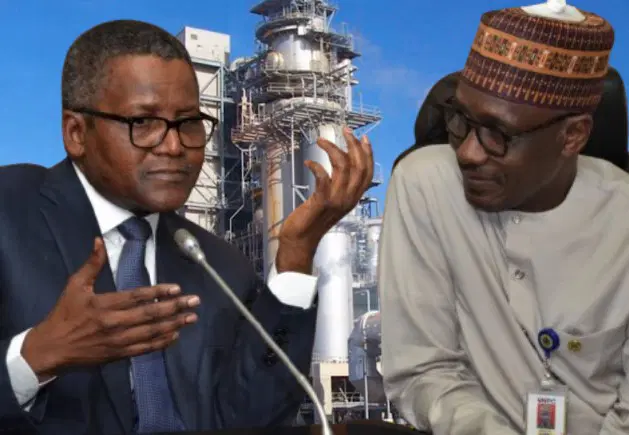
By Igwe Donald
Nigeria’s oil sector is on the cusp of transformation, with fresh perspectives sparking dynamic discussions that reveal the exciting potential for collaboration between stakeholders and the pursuit of national economic growth. Dangote Refinery’s recent press statement has ignited a lively debate about NNPCL’s visionary strategy. The clash between these two titans has exposed a complex web of corruption, greed, and political maneuvering that threatens to undermine Nigeria’s energy security.
The controversy has gained considerable attention due to the critical role of the Dangote Refinery in shaping the future of Nigeria’s energy industry. Despite claims of patriotic intent, the actions of NNPCL, under Kyari’s leadership, have been perceived by many as counterproductive and even conspiratorial.
Based on recent developments, particularly statements and counterstatements from Dangote and NNPCL, it becomes apparent that the battle is more than a mere industry dispute, it is a power struggle with national and international ramifications. Moreover, Kyari’s involvement in past corrupt dealings and the importation of substandard fuel adds a dark layer to an already convoluted situation.
At the heart of this conflict lies a simple question: what does the NNPCL truly want? The answer, as it turns out, is far from simple.
The Genesis of the Conflict
The inauguration of Dangote’s refinery was a landmark achievement for Nigeria’s energy sector. It was a symbol of hope, promising to end the country’s dependence on fuel importation, reduce foreign exchange strain, and address persistent fuel shortages that have plagued Nigeria for decades. Aliko Dangote’s vision was clear: to build a refinery that could refine over 650,000 barrels of crude oil per day, capable of meeting both local and regional demands for petroleum products.
However, this grand ambition did not sit well with all stakeholders, especially the NNPCL. The company, despite its monopolistic control of the country’s oil resources, has faced significant criticism for inefficiency, corruption, and a failure to provide Nigerians with affordable and consistent access to fuel. Under Mele Kyari’s leadership, these issues have only worsened. Instead of collaborating with Dangote to address the nation’s fuel challenges, NNPCL has repeatedly sabotaged the efforts of the refinery, questioning the quality of its products and attempting to control its pricing structure.
In an attempt to undermine Dangote’s progress, NNPCL began circulating narratives that the refinery would sell fuel at an exorbitant price of N898 per liter, a claim which Dangote promptly dismissed as “misleading and mischievous.” In a press statement, Dangote clarified that the refinery had sold its products to NNPCL in dollars, offering significant savings compared to the imports the NNPCL typically brings in. By doing so, Dangote was not only addressing the country’s fuel needs but also reducing the financial burden on Nigerians by keeping fuel prices reasonable.
NNPC: A Legacy of Exploitation and Its Reluctance to Change
What many don’t know is that, the current drama between NNPCL and Dangote is not an isolated incident but rather a symptom of a much larger problem that has plagued Nigeria for decades: the deep-rooted culture of exploitation within the oil sector. For far too long, NNPC (now NNPCL) has operated as a behemoth of inefficiency and corruption, enabled by a political elite more concerned with personal enrichment than national development.
Established in 1977, the Nigerian National Petroleum Corporation was intended to ensure that Nigeria could maximize its oil wealth for national development. Instead, the organization has often functioned as a vehicle for personal and political gain, mired in scandals involving missing funds, corrupt contracts, and fraudulent deals with foreign oil companies.
The current leadership under Mele Kyari is a continuation of this legacy. While Kyari portrays himself as a reformist, his actions suggest otherwise. His involvement in questionable fuel importation deals, particularly from Malta, is not just a footnote in his career but a key indicator of his intentions. His decisions, both public and behind closed doors, appear designed to maintain the status quo that benefits a select few while keeping the majority of Nigerians in a perpetual state of fuel scarcity, high prices, and dependence on foreign products.
NNPCL’s reluctance to embrace local refining capabilities, as demonstrated in its antagonism toward Dangote Refinery, suggests that the corporation is not interested in Nigeria becoming self-sufficient in fuel production. Instead, it seeks to retain its grip on the industry, using crude oil sales as leverage while engaging in backdoor dealings with international partners who continue to siphon Nigeria’s wealth abroad.
Mele Kyari and the Maltese Syndicate of Corruption
To fully grasp the depths of the ongoing conflict, one must look into the murky dealings of Mele Kyari and his long history of involvement in corrupt activities. Kyari has been repeatedly fingered in cases of importing substandard fuel into Nigeria. These dealings, often orchestrated through Malta-based syndicates with refineries abroad, have cost Nigeria billions in revenue while exacerbating the country’s energy crisis.
Kyari’s involvement in these syndicates points to a larger conspiracy designed to undermine local refining efforts, such as Dangote’s, and maintain Nigeria’s dependence on foreign fuel imports. The motive is clear: Kyari and his foreign partners stand to profit enormously from keeping Nigeria trapped in a cycle of importation, even as local refineries remain underutilized or sabotaged.
The Dangote Refinery, in this context, represents an existential threat to Kyari’s interests. By producing fuel locally at a fraction of the cost of imported fuel, Dangote’s refinery could potentially collapse the entire importation scheme, cutting off the illicit profits that Kyari and his associates have long enjoyed. This explains the relentless efforts to discredit Dangote’s refinery, first by questioning its quality and later by attempting to manipulate its pricing.
Dangote’s Fight for Transparency and the Battle for Control
Faced with NNPCL’s calculated sabotage, Dangote launched a counteroffensive, exposing the corporation’s true intentions. In a series of media appearances, Dangote debunked the claims of substandard products by presenting evidence of his refinery’s superior quality compared to the imported fuels that Nigerians had long been forced to endure. By making his case publicly and transparently, Dangote effectively dismantled the quality-based narrative being pushed by NNPCL.
However, this was only the beginning. Realizing that they could not win the battle over quality, Kyari and NNPCL shifted focus to pricing. Their strategy was simple: manipulate the public into believing that Dangote’s refinery would price its products excessively high, thereby allowing NNPCL and other foreign marketers to raise their own prices to exorbitant levels, all while blaming Dangote for the hikes and become frustrated to give up.
The hypocrisy in this approach is glaring. NNPCL, which sells crude oil to Dangote’s refinery just as it does to foreign oil companies, has no business controlling the refinery’s pricing. Yet, in a blatant display of power, the corporation demanded that it would set the price at which Dangote could sell his fuel. This action of theirs has is an absurd situation, but one that reveals NNPCL’s deeper motives: to maintain control over the pricing of fuel in Nigeria and keep Dangote’s refinery from offering cheaper, more accessible alternatives to the public.
The International Implications: Challenging the Global Oil Cartel
This battle between Dangote and NNPCL has obviously not gone unnoticed by the global oil industry. For decades, international oil companies have profited from Nigeria’s dependence on imported fuel, with major deals brokered between Africa and Europe that ensure these companies’ continued dominance over the continent’s energy sector. The success of Dangote’s refinery, however, threatens to disrupt this dynamic.
By producing high-quality fuel at a lower cost, Dangote’s refinery could potentially redirect the flow of oil trade in Africa. Countries with weak or devalued currencies, which currently struggle to buy oil in dollars, would find a more affordable option in Nigeria’s locally refined products. This would not only boost Nigeria’s influence in the African oil market but also diminish the power of European oil companies that have long held a stranglehold on the continent’s resources.
This potential shift in the oil trade has likely played a role in the aggressive stance taken by NNPCL and its foreign partners. As the refinery begins operations, there is a palpable sense of urgency among those who stand to lose the most from its success. Kyari’s alliance with these foreign powers, which include oil marketers and refinery owners in places like Malta, underscores the extent to which Nigeria’s energy future is being shaped by external forces with little regard for the country’s best interests.
The Future of Nigeria’s Energy Sector
In any society where corruption reigns unchecked, the role of the public becomes crucial. The ongoing feud between NNPCL and Dangote has made it clear that corporate power and government influence can often work hand in hand to distort the truth and manipulate public perception. This is why patriotic Nigerians must play a central role in demanding transparency and holding our leaders accountable.
As the battle between Dangote and NNPCL continues to unfold, it is clear that the stakes are incredibly high. At the heart of the conflict is not just the future of Nigeria’s energy sector but the broader question of who will salvage the country’s economic destiny. For decades, Nigeria has been held back by corrupt leaders and foreign interests who have exploited its resources for personal gain. Dangote’s refinery represents a challenge to this status quo, offering a vision of an independent Nigeria that can provide for its own energy needs without relying on foreign imports.
While Dangote’s refinery promises a solution to the decades-long fuel crisis, its survival depends on more than just its operational success. It depends on the will of the Nigerian people to recognize the larger forces at play and to stand up against the manipulations of entities like NNPCL. Public pressure has already shown its power—Dangote’s media campaign successfully exposed NNPCL’s dubious tactics and forced them to retract their claims. This is a victory for transparency, but it must be the first of many.
Yet, as NNPCL’s actions have shown, there are powerful forces determined to prevent this vision from becoming a reality. Mele Kyari’s sinister motives, driven by a desire to maintain control over Nigeria’s oil industry and protect the illicit profits of his foreign allies, have led to a concerted effort to sabotage the Dangote Refinery and undermine its potential benefits for the Nigerian people.
In the face of these challenges, Dangote’s determination to fight back offers a glimmer of hope. His willingness to engage the public, expose NNPCL’s corruption, and champion the cause of transparency and accountability sets him apart from the many business and political leaders who have allowed Nigeria’s energy sector to be exploited for decades.
The outcome of this battle is far from certain. However, one thing is clear to all: Nigeria stands at a critical crossroads. The decisions made in the coming months will determine whether the country can finally break free from the chains of oil dependency and corruption or whether it will remain trapped in a cycle of exploitation, benefiting a few at the expense of the many. The Dangote Refinery holds the key to unlocking a brighter future, but only if it can overcome the formidable obstacles placed in its path by those who seek to maintain the status quo.
A Call for Institutional Reform and Accountability
The NNPCL-Dangote conflict highlights the urgent need for institutional reform in Nigeria’s oil sector. As long as entities like NNPCL are allowed to operate with impunity, prioritizing personal gain over national interest, Nigeria’s energy sector will remain dysfunctional. Reforming NNPCL will require more than just leadership changes, it will require a complete overhaul of its operational structure, with a focus on transparency, accountability, and efficiency.
At this point, President Bola Ahmed Tinubu must step in, he must rescue Nigeria from the hands of devourers. Mr President must ensure that this reform must start with strengthening regulatory bodies tasked with overseeing the oil sector. These bodies must be empowered to hold NNPCL and other players accountable, ensuring that they operate in the best interest of the Nigerian people. Additionally, there must be stricter penalties for corruption within the industry, with real consequences for those who engage in illicit activities like fuel importation scams and price manipulation.
Furthermore, Nigeria must develop a robust framework for supporting local refining efforts. This includes providing incentives for other private investors to follow in Dangote’s footsteps, fostering competition, and ensuring that no single entity—whether NNPCL or Dangote—holds a monopoly over the country’s oil resources. A diversIfied and competitive oil sector is key to ensuring that Nigeria can meet its energy needs while protecting consumers from price gouging and supply shortages.
Conclusion
As this reality keeps unfolding, Nigerians must brace themselves for the challenges that lie ahead. The battle between Dangote and NNPCL is far from over, and the outcome will have profound implications for the country’s future. Mele Kyari’s corrupt dealings, his collusion with foreign oil marketers, and his attempts to sabotage Dangote’s refinery all point to a deeper crisis within Nigeria’s oil sector.
Yet, despite these challenges, there is reason to hope. Dangote’s refinery represents a new beginning, a chance for Nigeria to take control of its own energy future and end the cycle of dependence and exploitation that has held it back for so long. However, achieving this goal will require vigilance, transparency, and a willingness to confront the powerful interests that seek to maintain their grip on Nigeria’s oil industry.
In the coming months, as fuel prices shift and the propaganda war intensifies, Nigerians must remember one thing: the future of their country is in their hands. If they stand by Dangote’s vision for a self-sufficient Nigeria, they can reclaim control over their energy destiny. If they allow NNPCL’s manipulations to succeed, the cycle of dependency and exploitation will continue. The choice is clear, but the road ahead is fraught with challenges. The rainy season is indeed upon us—whether it brings renewal or devastation depends on the actions taken today.
Nigerians must remain vigilant as fuel prices begin to fluctuate and as NNPCL’s propaganda continues to spread. Informed citizens can resist the temptation to accept false narratives at face value and must seek out the truth behind the machinations of the oil industry. Furthermore, Nigerians should advocate for stronger regulatory mechanisms that prevent corporate sabotage, while also pushing for more significant oversight of the oil sector to prevent future exploitation by foreign interests and corrupt officials.
The path forward will not be easy, but it is clear that the stakes are too high for inaction. Nigerians must demand more from their leaders and corporations. They must hold Mele Kyari and NNPCL accountable for their actions and insist on a future where Nigeria’s oil resources benefit the many, and not the few. As Dangote’s refinery begins production, the hope is that it will usher in a new era of energy independence and prosperity for Nigeria. But this hope will only be realized if the forces of corruption and exploitation are confronted head-on and defeated.
Right now, the future of Nigeria’s energy sector hangs in the balance. It is imperative that the government intervene to put an end to the corrupt practices of the NNPCL and ensure that Dangote Refinery is allowed to operate freely.
By doing so, Nigeria can take a significant step towards a brighter future, one in which its citizens have access to affordable, reliable energy. The stakes are high, but the rewards are even greater.
Donald is a public affairs analyst and wrote this piece from Agege, Lagos State
Opinion
Dr. Bello Matawalle: Digitising Nigeria’s Military Pensions Verification Process
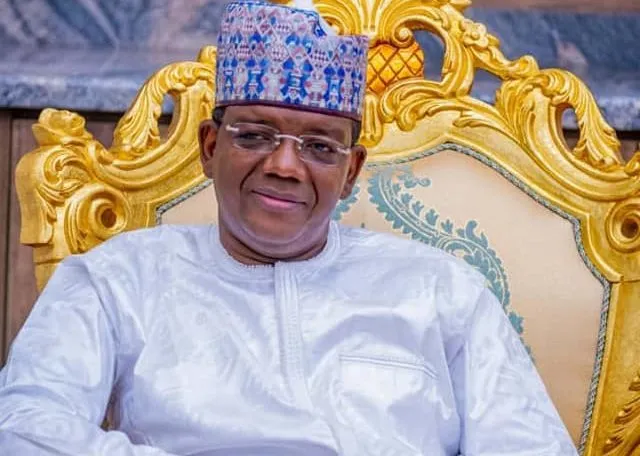
For decades, Nigeria’s retired military personnel have been compelled to travel hundreds, sometimes thousands, of kilometers—particularly for those abroad—merely to fulfill the annual requirement of verifying their identities at the Military Pensions Board. This antiquated system, both costly and time-consuming, has placed an undue strain on the lives and resources of Nigeria’s veterans.
The Nigerian Military Pensions Board, the institution tasked with managing retirement benefits for military retirees and administering death benefits to their next of kin (NOK), has long relied on physical verification exercises to validate the status of eligible pensioners within its database.
Historically, these verification exercises required veterans or their NOK to appear in person at designated centers for authentication.
A turning point came just a few months ago. Under the stewardship of Dr. Bello Matawalle, the Nigerian Military Pensions Board (MPB) introduced a fully digitized system for the verification of military pensions. This modernization allows for seamless, electronic verification of pensioners, whether they reside within Nigeria or abroad, using secure identification such as international passports, National Identity Numbers (NIN), or driver’s licenses.
This initiative represents a watershed moment in ensuring the continued welfare of Nigeria’s veterans.
By transitioning to a digitized system, Dr. Matawalle has not only mitigated the physical and financial toll once imposed on veterans and their families but also eradicated the need for arduous travel to verification centers. Pensioners can now complete the verification process from the comfort of their homes, regardless of their geographic location.
This digital transformation brings unparalleled convenience and accessibility. Veterans can now authenticate their status with ease, from any corner of the globe, obviating the risks associated with long-distance travel.
Beyond convenience, this overhaul results in significant savings in both time and resources. Veterans once burdened by exorbitant airfare and accommodation costs to fulfill their obligations now find their finances preserved.
Equally important, the new digital process curtails human error, ensuring the accuracy of pension records nationwide. It ensures the use of robust, secure identification methods that significantly reduce the risk of fraud, guaranteeing that only eligible beneficiaries receive their entitlements.
In an era where efficiency and security are paramount, Dr. Matawalle’s reforms exemplify the promise of technology in public administration. By embracing digital innovation, the Military Pensions Board has not only streamlined a burdensome process but also reinforced the dignity of Nigeria’s veterans, ensuring they are accorded the respect and ease of service they deserve in retirement. This is a model of modern governance that other sectors would do well to emulate.
Nathaniel C. Adoji writes from Kaduna
-
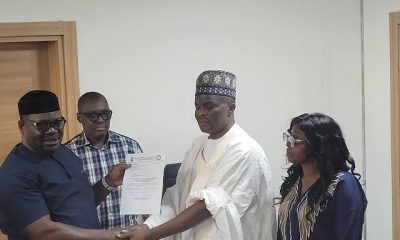
 Business15 hours ago
Business15 hours agoOkpella Monarch: Obaseki Ratified Kingmakers Decision, End 5years leadership Vacuum
-

 Banking11 hours ago
Banking11 hours agoFree Food Saga: Akpabio quoted out of context-CSO
-

 Foreign15 hours ago
Foreign15 hours agoSci-tech innovation fuels China’s high-quality development
-

 Entertainment7 hours ago
Entertainment7 hours agoDavido Declares ‘Timeless’ His Best Album
-

 Entertainment7 hours ago
Entertainment7 hours ago‘Adire’ Secures Four Nominations at the Best of Nollywood Awards
-
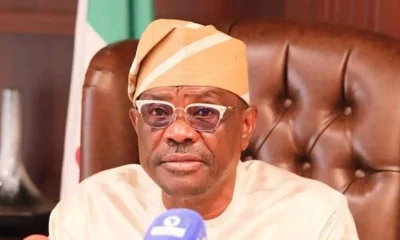
 Business8 hours ago
Business8 hours agoWike Urges Nigerians to Pay Taxes for Improved Social Services
-

 Foreign9 hours ago
Foreign9 hours agoQinling Mountains better safeguarded with comprehensive digital platform
-
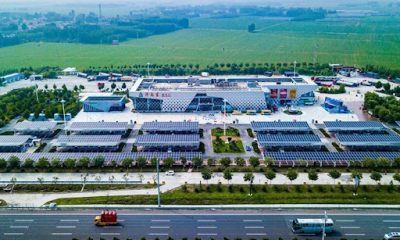
 Foreign9 hours ago
Foreign9 hours agoExpressway service station in Shandong achieves carbon neutrality






